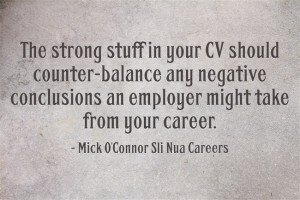By Mick O’Connor, Career Coach, Sli Nua Careers Athlone

Q: Since leave college 18 years ago, I’ve been around. I’ve had ten jobs – job-hopping wasn’t part of my master plan, but it’s just the way it has worked out. I’ve done quite well in some jobs, and I have also had some hairy moments, but my problem now is how I depict all of this in my CV. I think the reader will get dizzy. All suggestions welcome? (LV, email).
A: The primary challenge in crafting your curriculum vitae, LV, is the same as the one that faces every person writing their CV – showcase your strengths (experience, characteristics, achievements, awards, education, training and the like) so effectively that the employer wants to meet you. Yes, they will figure you have a chequered career. That’s an almost unavoidable conclusion. Make them figure, too, that you have ability, ambition and drive.
The problem with most CV’s – from those held by people ensconced in the same job for the past 30 years to those selling the person just starting out on the journey – is that the document doesn’t sell the person properly in the first place. It hasn’t turned the employer on at any point. The strong stuff in your CV should counter-balance any negative conclusions an employer might take from your career. And, on that very topic, you should take the best from the job movements you have had, particularly during a job interview, because benefits lurk there too. The onus, however, rests on you to package it all so that it makes sense to the employer and stimulates their interest. In writing your CV, you can create two separate sections – Relevant Work Experience and Other Work Experience. Put the Relevant Work Experience close to the top of your CV, and park away the Other Work Experience later on.
 Devote more bullet points to the Relevant Work Experience. Lead the employer to those jobs. Relevance is determined by the next potential employer’s needs, by and large, but, in your case, you can decide to place in Other Work Experience certain jobs that did not work out well even though the job title might appear relevant to the potential employer. In this way, under Relevant Work Experience, you can shine the light on the jobs that work well for you in your CV and deflection attention away – without excluding – from those that are not doing you any significant favours.
Devote more bullet points to the Relevant Work Experience. Lead the employer to those jobs. Relevance is determined by the next potential employer’s needs, by and large, but, in your case, you can decide to place in Other Work Experience certain jobs that did not work out well even though the job title might appear relevant to the potential employer. In this way, under Relevant Work Experience, you can shine the light on the jobs that work well for you in your CV and deflection attention away – without excluding – from those that are not doing you any significant favours.
The Relevant Work Experience should help to create a greater feeling of stability or permanence as it will be populated by jobs you held for longer periods. It’s a subtle thing – and not guaranteed to stop the employer from reaching their own, thumbs-down conclusion about your experience – but it stands a better chance of getting you to interview than if you outline everything you have done in the same list, with equal attention being given to every role.
It is up to you to serve up to the employer the information that helps to put you in the frame. Apart from that piece of re-working, look at creating a section early in your CV along the lines of ‘Major Achievements, Skills (or Competencies) & Characteristics’. Use it to aggregate various experiences you have had: again, the aim here is to alert the employer to what you offer their company.
Mick O’Connor is a Career Coach with Sli Nua Careers and works out of Athlone. You can read more abouthim, and make a booking HERE for CV Preparation and Interview Training.
More articles fromhis blog can be accessed HERE
